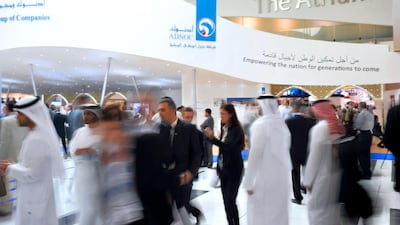As Adipec, Abu Dhabi's premier annual oil gathering, starts today, the foremost question for top oil company executives will be which of them – if any – will win lucrative contracts to develop the emirate's prime oil and gas resources.
None is more eagerly awaited than the announcement of a new consortium for Adco, the company overseeing onshore fields, which account for about 40 per cent of the country’s 2.8 million barrels per day of production.
The old concession expired at the start of the year, so the 9.5 per cent stakes owned by BP, ExxonMobil, Royal Dutch Shell and Total, plus a 2 per cent share owned by Partex, reverted to Adnoc, the state oil company.
As the decision-making process has dragged on, there has been much speculation that the Supreme Petroleum Council, the ultimate authority on new concessions, would favour companies from Asia, which have become the dominant buyers of Abu Dhabi’s crude in recent years, accounting for more than 90 per cent of its oil exports. The speculation has centred on companies including PetroChina, Korea National Oil and Inpex of Japan.
However, the big international oil companies in presentations to Adnoc technocrats and other key decision-makers over the past year have emphasised one of their main advantages: advanced technology, especially enhanced oil recovery (EOR), a blanket term covering a wide range of proprietary techniques to get the most out of oil reservoirs.
Abu Dhabi has a long-held interest in EOR, with which it has had much success, and it will become even more important for future development as the chances of further major discoveries look remote.
"What the UAE lacks in new discoveries it makes up for with an emphasis on EOR techniques designed to extend the lifespan of the Emirates' existing oilfields," according to the US energy information agency. "By improving the recovery rates at the existing fields, such techniques helped the UAE to nearly double the proved reserves in Abu Dhabi over the past decade."
Such technologies play a central role in Adnoc's talks with international oil companies, especially looking for methods that will use carbon dioxide injection to retrieve more oil while also capturing natural gas for commercial use, according to Ali Al Shamsi, the head of strategy and coordination at Adnoc.
"There is a lot of local demand for gas. So when it comes to EOR we are working very hard with partners in the international oil companies to free up the gas," Mr Al Shamsi said. "We are working on a lot of breakthrough technologies, many pilot projects, on how to use CO2 as a means of pressure maintenance to free up the gas."
In terms of oil recovery “if only 1 per cent could be added it would be a quantum leap”.
Competition is fierce and oil companies are protective of their technologies and techniques. They are primarily looking to boost production from oilfields, but there are other considerations too.
“All oil wells have a water issue and that is particularly high in the UAE, up to 80 per cent,” said Mario Aufiero, the head of Baker Hughes in Abu Dhabi. “You are spending money to lift it then more money to dispose of water produced.”
Baker Hughes has been applying a combination of its technologies in a pilot project aimed at bringing to life a dormant field associated with the Bida Al Qemzan project. For water management, it uses specialty gels and chemicals which it acquired when it bought GelTech in 2012. It is also using a process called logging while drilling (LWD) for the first time outside the US, allowing it to get speedy real-time information on the reservoir, as well as a tunnelling and drainage technique that achieved a tenfold production increase in Umm Gudair field in Kuwait.
The pilot test on the previously dormant well has resulted in good oil flow rates with water content of just 10 per cent, according to Baker Hughes. Adnoc is moving ahead cautiously as its priority is to do nothing that could damage the reservoirs – especially its giant fields – as it tries to maximise extraction. “We don’t want to take any risk with those fields, so we take a pilot approach,” says Mr Al Shamsi. “When introducing a new agent, like CO2, you don’t know what’s going to happen, so we are very meticulous.”
BP recently signed a deal to start a pilot project in Abu Dhabi using technology similar to its LoSal enhanced recovery project in the Clair Ridge field in the UK’s North Sea sector. It is partnering with Admo-Opco, the Adnoc company that overseas offshore oilfield development. BP also is helping Adnoc fulfil another of its goals, technology transfer and skills development, and has dozens of its staff seconded to Adma-Opco.
“The easy oil is over and it is coming to a stage where you need to think outside of the box and EOR is one of the options,” said AbdulKarim Al Mazmi, head of BP in Abu Dhabi. “Adnoc is setting a very high target for recovery from oilfields, 70 per cent, and they are way below that now. It’s no secret that EOR is key to that and is one of the main elements of competition.”
amcauley@thenational.ae
Follow The National's Business section on Twitter

